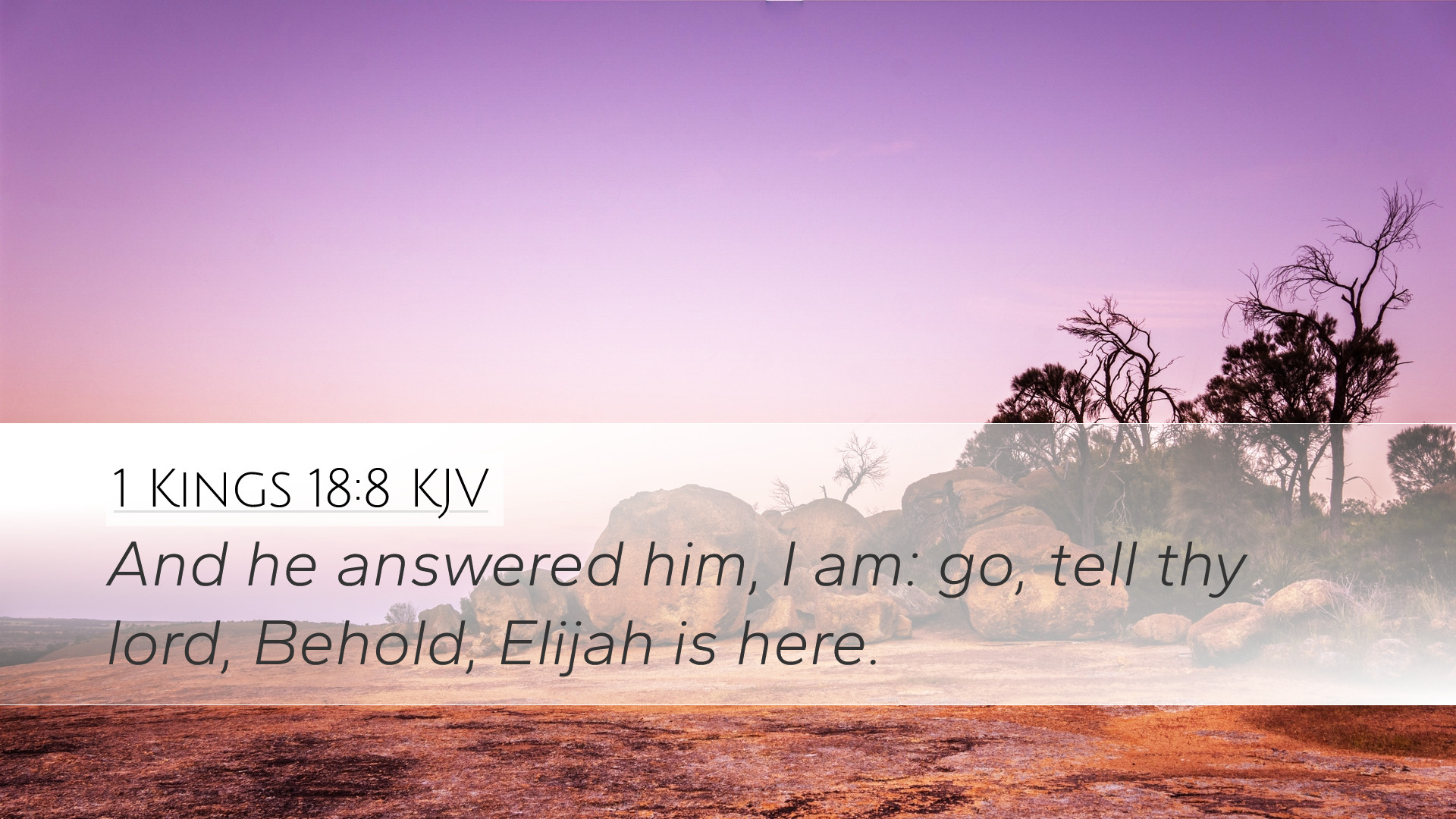Commentary on 1 Kings 18:8
Verse Reference: 1 Kings 18:8 - "And he answered him, I am: go, tell thy lord, Behold, Elijah is here."
Contextual Overview
This verse occurs within the dramatic narrative of Elijah's confrontation with King Ahab and the prophets of Baal. In the preceding chapters, Israel is depicted as being steeped in idolatry, largely influenced by Ahab's marriage to Jezebel and the widespread worship of Baal. Elijah, as a prophet of Yahweh, stands as a solitary figure, called to challenge the prevailing religious practices of his time.
Exegesis and Analysis
The response of Elijah, "I am," serves several theological purposes:
- Affirmation of Prophetic Identity: Elijah's declaration of his identity is not merely an introduction. It conveys a sense of purpose and authority. Biblical prophets often faced significant danger when delivering messages, and here Elijah signals his readiness to confront Ahab.
- Emphasis on Divine Mandate: The phrase can also be viewed as Elijah positioning himself as an agent of God, not merely a man seeking to curry favor. His identity is bound with his mission, underscoring the seriousness of the confrontation that is about to unfold.
- Ironic Godship of Baal: In contrast to Ahab’s worship of Baal—a deity associated with fertility and rain—Elijah embodies the living God. His approach is to invoke not just a mere declaration of presence but to highlight the futility of Ahab’s reliance on Baal.
Theological Implications
Within the framework of theological discourse, several implications arise from this interaction:
- God's Sovereignty: The verse illustrates the overarching theme of divine sovereignty. Despite the idolatry present in Israel, God has preserved His prophet and has a plan to reclaim His people.
- Discipleship and Responsibility: Elijah's willingness to confront the king serves as a model for pastoral courage and faithfulness. It speaks to the essential duty of believers to stand firm in truth amidst cultural pressures.
- Hope in Despair: This moment marks a turning point for Israel, as Elijah's announcement heralds the possibility of return to covenant faithfulness. Pastors and theologians can draw parallels in contemporary contexts where society leans toward secularism and idolatry.
Lessons for Pastors and Students
From this brief yet profound verse, several lessons can be gleaned for pastoral practice and academic study:
- The Importance of Identity: Understanding one's identity in Christ is foundational to effective ministry. Just as Elijah was clear about who he was, so too must ministers and students of Scripture cultivate a strong sense of their identity as representatives of God.
- Faithfulness in Adversity: Elijah’s confrontation with Ahab is a reminder that obedience to God’s call often places individuals in perilous situations. This reality should encourage resilience among believers.
- Engagement with Culture: In a world that often opposes biblical truth, Elijah’s example teaches the importance of engaging cultural norms without compromising divine truth.
Reflections from Public Domain Commentaries
Matthew Henry's Concise Commentary
Matthew Henry underscores the dramatic tension of Elijah’s confrontation with Ahab. He reflects on Elijah's courage and the larger battle between the worship of Yahweh and the pagan practices of Israel. Henry reminds readers of God’s faithful preservation of His prophets, suggesting that no matter how dire the circumstance, God never leaves His own.
Albert Barnes' Notes on the Bible
Barnes emphasizes the significance of Elijah’s proclamation, “I am.” He draws a parallel with the self-identification of God in the burning bush, suggesting a deeper theological connection. Moreover, Barnes points out the prophetic significance of Elijah’s upcoming encounter with Ahab, which serves as a crucial moment in Israel’s history.
Adam Clarke’s Commentary
Adam Clarke examines the narrative dynamics of the passage, particularly the role of the messenger. Clarke argues that Elijah’s boldness illustrates the calling of every servant of God to stand firm regardless of opposition. He also discusses Elijah’s purpose of turning the hearts of Israel back to the one true God, highlighting the need for deep repentance and restoration amongst God’s people.
Conclusion
1 Kings 18:8 encapsulates a pivotal moment in the biblical narrative, rich with meaning and application for contemporary believers. It challenges pastors, students, and scholars to consider the weight of their identity, the necessity of faithful engagement with cultural norms, and the powerful reminder of God’s sovereignty over all circumstances. As we reflect on this verse, may we be inspired to embody the courage of Elijah in our own contexts, proclaiming truth amidst adversity.


